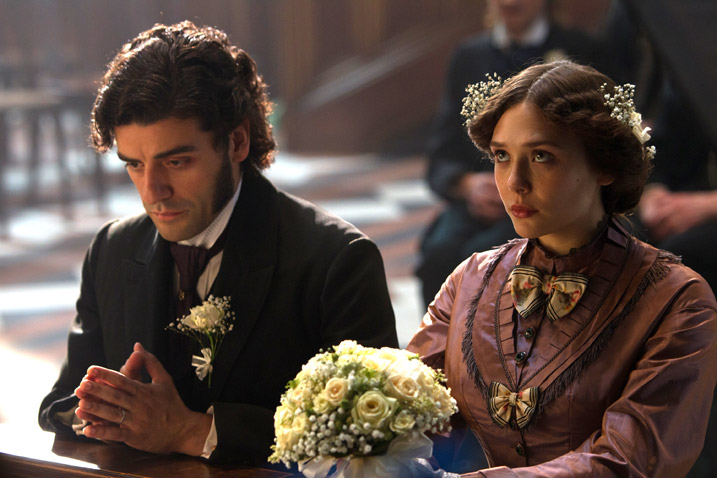
What a tangled web we weave when with heaving bosoms and pained looks of longing we deceive, and Charlie Stratton‘s adaptation of author Emile Zola‘s “Therese Raquin” certainly features enough scenes of both of those. It’s a story that’s been brought forth in a number to TV productions and most notably on the big screen in Marcel Carné‘s 1952 effort, and while this latest attempt at the material doesn’t do anything strikingly radical, it does allow the lead trio of Elizabeth Olsen, Oscar Isaac and Jessica Lange take thoroughly decent, if unexceptional, material and make it more compelling and dramatic than it has any right to be.
Certainly, there is no move in “Therese” you don’t see coming, but again the talent in front of the camera, if not completely elevating the script, at least make it engaging enough that it rolls along painlessly. Therese (Olsen) is orphaned and grown into a young woman by time the opening credits are finished, and the first act is barely over before she’s married by her aunt (Lange) to her cousin, the sickly mama’s boy Camille (Tom Felton), whose name—interchangeable between genders, and coming from the Latin for temple servant—speaks volumes about his lack of masculinity. The trio abandon rural French life, to move to the big city of Paris, where Camille has secured an unglamorous but steady office job, while his mother opens a fabric shop. Therese gets used to her dull life, helping out in the store—located in a dark corner of an alley off a main thoroughfare—until one day, Laurent (Isaac) comes strolling into her life.

A friend of Camille’s who also works at the same company he does, Laurent turned down a career as a lawyer to pursue art, which he now does on the side. But it’s clear there are few life experiences he hasn’t encountered, and played by Isaac—especially against a meek Felton, who is great in the kind of role that often goes unrecognized—his raw, sexual power oozes palpably from the moment he steps into the frame. And Therese, whose passions aren’t being fulfilled like they would be by Camille, is eager for her lust to be quenched, and soon she’s in the throes of an affair. Carnal pleasure soon turns into a relationship, declarations of love and a deadly plan is enacted so they can be together forever.
Before you cry spoiler about a movie based on a book that’s over 140 years old, you will know all this is coming anyway. But Olsen and Isaac are so good in their scenes together, projecting with little more than their physical standing and how they handle their bodies, the passions that are brewing beneath the corsets and vests, that watching them interact is easy. And the atmosphere of caged heat is aided by cinematographer Florian Hoffmeister‘s work, which softly goes more honey hued when these young lovers finally get to be alone, before returning to the anonymous blue and brown settings of the store and streets when they’re apart. Having lensed Terrence Davies‘ gorgeous and underrated “The Deep Blue Sea,” it seems he’s made it a specialty of capturing couples on a doomed path.

But even for all this effort (and we’d be remiss not to be mention Lange, who is very good as well as the needy matriarch), Stratton’s workmanlike approach, and script’s stuffy, unfussy and very traditional format works against itself. The story of “Therese” is one that aims to play like a tragedy, but instead it sorta stumbles through the last act toward a finale that feels like indifferent inevitability. As grotesque as they become, you still feel for Therese and Laurent, who are both trying to move out of their stations in life, that have seen them put dreams in drawers, perhaps never to be seen again. But aside from a couple of brief moments, the film is more procedural, getting far too caught up in the will they/won’t they than really investing in what the outcome could mean on a more personal level.
“Therese” is many ways is almost unreviewable, or not an easy one to critique, because there’s nothing egregiously wrong with the film. From nearly every angle and aspect, “Therese” doesn’t particularly leave you wanting and the actors and filmmaker are all doing what the script is asking of them. But the movie is so respectable and formal, that you wish Stratton had directed it with the same intensity of feeling that Therese and Laurent feel for each other. In the end, “Therese” is almost voyeuristically distant from what’s happening on screen, asking the audience to observe, but leaving just enough a gap of being completely engaged, that while everything is very well articulated, the impact is more academic than sensual. [B-]





